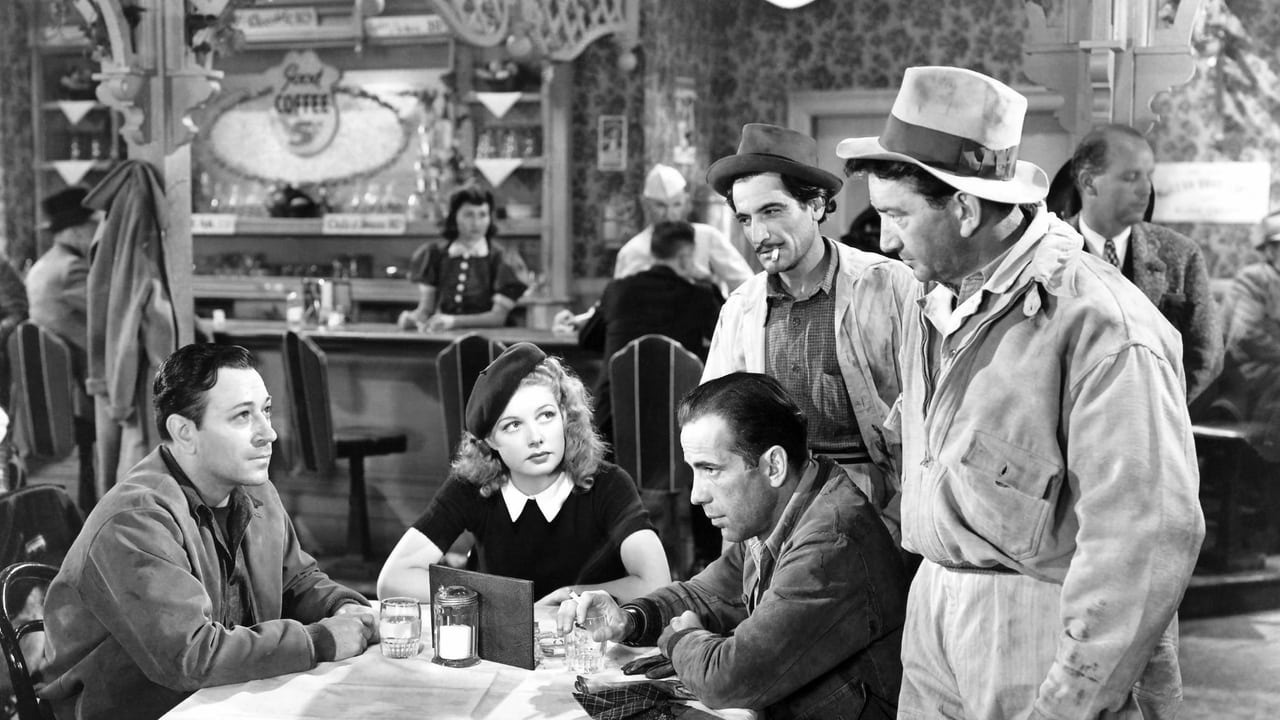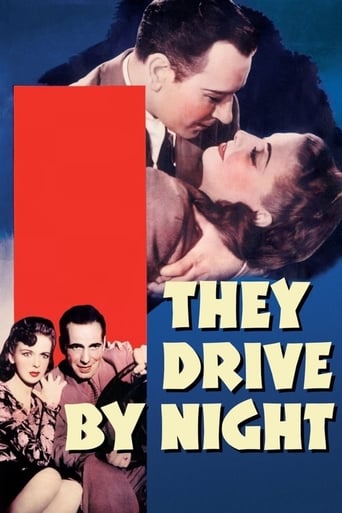



A Brilliant Conflict
This story has more twists and turns than a second-rate soap opera.
View MoreMostly, the movie is committed to the value of a good time.
View MoreWhile it doesn't offer any answers, it both thrills and makes you think.
View More"They Drive by Night" starts as a powerful blue-collar drama involving two embattled truck drivers, George Raft and Humphrey Bogart as siblings Joe and Paul Brasini, and it ends like a traditional film-noir with Ida Lupino as an over-possessive femme fatale and George Raft as the unfortunate object of her twisted affection. Raft is the common link between two stories that could've been easily separate, making the title even more questionable. In French, it's "A Dangerous Woman", a wiser choice given how prominent Ida Lupino gets in the second half of the film, delivering the most powerful performance among its star-studded cast.But let's get back to the first act, it is a brilliant social commentary about the hardened conditions of truck drivers, traveling in pairs, switching roles in order to gain some sleep, the dialogues cut straight to your heart, the male brotherhood, the solidarity between drivers, their economical struggle while depending on crooked bosses, no mention of unions or drivers' right, it's not "Hoffa" but more of a Steinbeck-like "Wheels of Wrath" with some heart-pounding sequences à la "Wages of Fear". The part featuring Bogart trying to resist to sleep left me on the edge, having just experienced a similar moment while driving alone on a monotonous road, I knew how it feels to feel your eyes heavy and then close them enough to see you getting off the road.The first act is a riveting experience, and it wouldn't have hurt the story to keep on that direction. I loved Paul's melancholic monologues about missing his wife, getting to bed, this speaks something powerful about the way these men lived, they didn't need money to live fancy lives, sleeping was the cherished treasure. And like modern-day explorers or sailors, their benevolent wives waited for them, expecting the worse, for it wasn't uncommon to some drivers who dreamed of sleeping to sleep once and for all. The film oscillates between dramatic moments and some comic reliefs, through Roscoe Karne as the driver who constantly wastes his pay on pinball's. But don't get it wrong, this isn't just a man's film, women play a significant part, and this is how fresh and modern that first act feels.Ann Sheridan plays her usual wisecracking roles, with the waitress who'll always outsmart all the witty quirks addressed to her, she's not just an eye-catching red head, she sure knows how to catch a man's heart, and the no-nonsense look George Raft keeps on her says a lot. But it's Gale Page who caught my heart as Paul's wife. She begged him for children believing it would at least conceal her loneliness, but Paul doesn't feel ready. Her speech in the hospital after Paul lost his right arm is intelligently thought-provoking; she's glad he lost an arm, it's a small price to pay if it could finally earn her peace of mind, and a stability in her couple. It's not cynical, it's only a tough reaction to one of the toughest rackets ever, one that make gangster look like wimps.And now I guess it's time to get to the second half, to Ida Lupino. Her Lana Carlsen is not the dedicated housewife, or the street-wise down-to-earth girl, but the ultimate gold-digger with only contempt for her jovial and fun-loving husband, Alan Hale as Ed Carlsen an old friend of Joe who obviously succeeded. She must've loved something in Ed, and it's not his age, his bonhomie, his looks, his childish puns, the way he keeps laughing at them, or his incomparable talent as a party animal, so she's a venal woman, and the only spot in her heart is for Joe. By the way, Al Hale gave a scene-stealing performance a lovable buffoon, and his brutal murder was certainly a turning point in the film. We're plunged in an ocean of darkness as soon as good old Ed leaves the screen.The murder, memorable for its use of electric eyes, borrowed some elements from Bette Davis' "Bordertown" to boost Lupino's reputation as a new Davis. And somewhat, she deserved that publicity because she added a tragic dimension to her vileness, and her portrayal of mental dementia is still efficient even from a modern perspective. But what was the point to feature a murder so late in the film, and rushed up the rest in less than twenty minutes. So many things happen events lose their impact: Joe, after working for Ed, becomes Lana's partner, business works, but she's so wrapped up by her ego she admits her murder after learning about his marriage with Cassie (Ann Sheridan). She then, accuses him of setting up the whole scheme but on trial, she breakdowns and repeat anxiously : "The doors made me do it" (the film's defining moment)While, it could have done without that manic laughter, her performance was the highlight of the film and it was one of the most despicable female villains ever, but there's nothing Joe ever does: he owes his freedom to Lana's breakdown, his job to their partnership and to Ed's friendship, his figure is so diluted that you wonder what she found in him in the first place, was that man worth that waste? Sure, there's Lupino's performance but I'm not sure it was worth abruptly cutting on that powerful truck story, or maybe with a stronger lead I have nothing against Raft, but as the film's top-biller, he's clearly out-shadowed by all the other protagonists. My DVD of the film belongs to the Bogart's collection and it couldn't have been more misleading: an elegant Bogart drives a car while holding Lupino, with Raft sitting next. Thankfully, this is one of Bogart's last performances as a sidekick, and Raft's greatest contribution to cinema was to allow his career to take off by turning down "High Sierra", "The Maltese Falcon" and "Casablanca". After "High Sierra", Bogart would never sit on the front side, he'll drive his movies by himself.
View MoreThis is a great movie and one I really enjoyed. The cast are all excellent with Ida Lupino being a stand out principle. The story about 2 brothers hauling across the States is gripping story mixed with a bit of humour, drama and murder. Ida Lupino's court room scene is memorable as she tries to lie her way out. Along with excellent performances by a great supporting actors including Alan Hale as the jolly happy trucking company owner and Roscoe Karns as the humorous Irish. This is not a Humprey Bogart movie, his big break was to come in his next movie, but he delivers along fine performance alongside George Raft. I really enjoyed this movie.
View MoreThey Drive by Night (AKA: The Road to Frisco) is directed by Raoul Walsh and adapted by Jerry Wald & Richard Macaulay from the novel "The Long Haul" written by A. I. Bezzerides. It stars George Raft, Ann Sheridan, Ida Lupino and Humphrey Bogart. Adolph Deutsch scores the music and Arthur Edeson is the cinematographer. Plot finds Raft & Bogart playing the Fabrini brothers, two guys trying to make a living as truck drivers during the Depression era. Just about keeping afloat in a very competitive market, the boys find that they have to work longer hours to stay ahead in the game. But that brings fatigue and danger, and with the repo men after them they could do with a break; a break that comes by way of work for Ed Carlson (Alan Hale). But the fortune is short lived as trouble awaits, not only on the road, but also in the form of Carlson's wife, Lana (Lupino).Warner Brothers produce a film of two differing halves that blends social realism with film noir edges. The script is tight as the narrative firstly deals in an adventure with period detail, then shifts to drama as bad luck and a bad woman come into play. There's zippy dialogue to digest, too, while Walsh keeps the pace brisk and provides good attention to detail in relation to the subject of the trucking industry. With Bogart a year away from leading man status (High Sierra/The Maltese Falcon), he was fourth billed for this movie. He gets relegated to the sidelines for the second half of the piece but by then he had made his mark. Sheridan is effective, in what ultimately is a love interest role, while Raft dominates as the centre piece character. But it's Lupino's movie all the way. True enough to say that her pivotal scene has a touch of the over theatrical histrionics about it, but it works in context to how she had formed the character up to then. Playing it man hungry and vixen like; yet with a sternness that oozes business woman sensibilities, her performance earned her a studio contract.Two movies for the price of one, then, and nary a dull moment in either of them. 7.5/10
View MoreThey Drive By Night shows the tough and tight world of truckers, circa 1940. George Raft and Humphrey Bogart play the Fabrini brothers, Joe and Paul, who live in a world of long distance driving across the country's winding roads, cozy diners, smart-talking waitresses, and the camaraderie of their fellow truckers. George Raft gives a solid performance as Joe Fabrini, who's driven by his dream of owning his own truck one day, and answering to no one. Humphrey Bogart as Paul Fabrini, is more comfortable with his lot, yet would literally give his right arm in service to his brother's dreams. Always one step ahead of frustrated bill collectors and the wrath of their bosses, the scrappy and wise-cracking Fabrini brothers are a popular duo on the road. Along the way, Joe meets a waitress, Cassie, (a lovely Ann Sheridan) who sparkles through his gritty world, slinging snappy backtalk and steak with the best of them. Gale Page delivers as Pearl Fabrini, the devoted wife of Paul, who is weary of seeing her husband drive off into the sunrise after a few scant hours of domestic bliss. Alan Hale, Roscoe Karns, and George Tobias round out the cast. Yet all eyes are riveted on Ida Lupino, who steals the show with her tour-de-force performance as bitter and ill-tempered Lana, who stops at nothing to get her man – in this case our boy, Joe. Whether carping about Joe's clothes and lack of attention or sniping at her working class husband, Ed, Lupino hammers the point home that hell than no fury like a woman in heat who is ignored. The unforgettable moment comes during the climatic courtroom scene, which is strictly vintage Lupino all the way. This black-and-white classic, skillfully directed by veteran Raoul Walsh (White Heat, The Strawberry Blonde, Sadie Thompson, What Price Glory), has many film noir elements, but is too optimistic in this reviewer's opinion to be assigned a place within the noir library. The screenplay by Jerry Wald and Richard Macaulay, moves along at a steady pace, full of good humor, drama, and thrills. And you'll never look at an automatic garage door the same way again!
View More